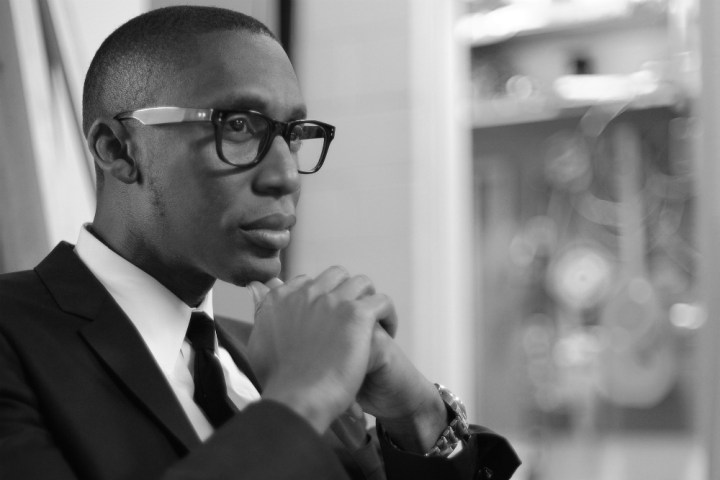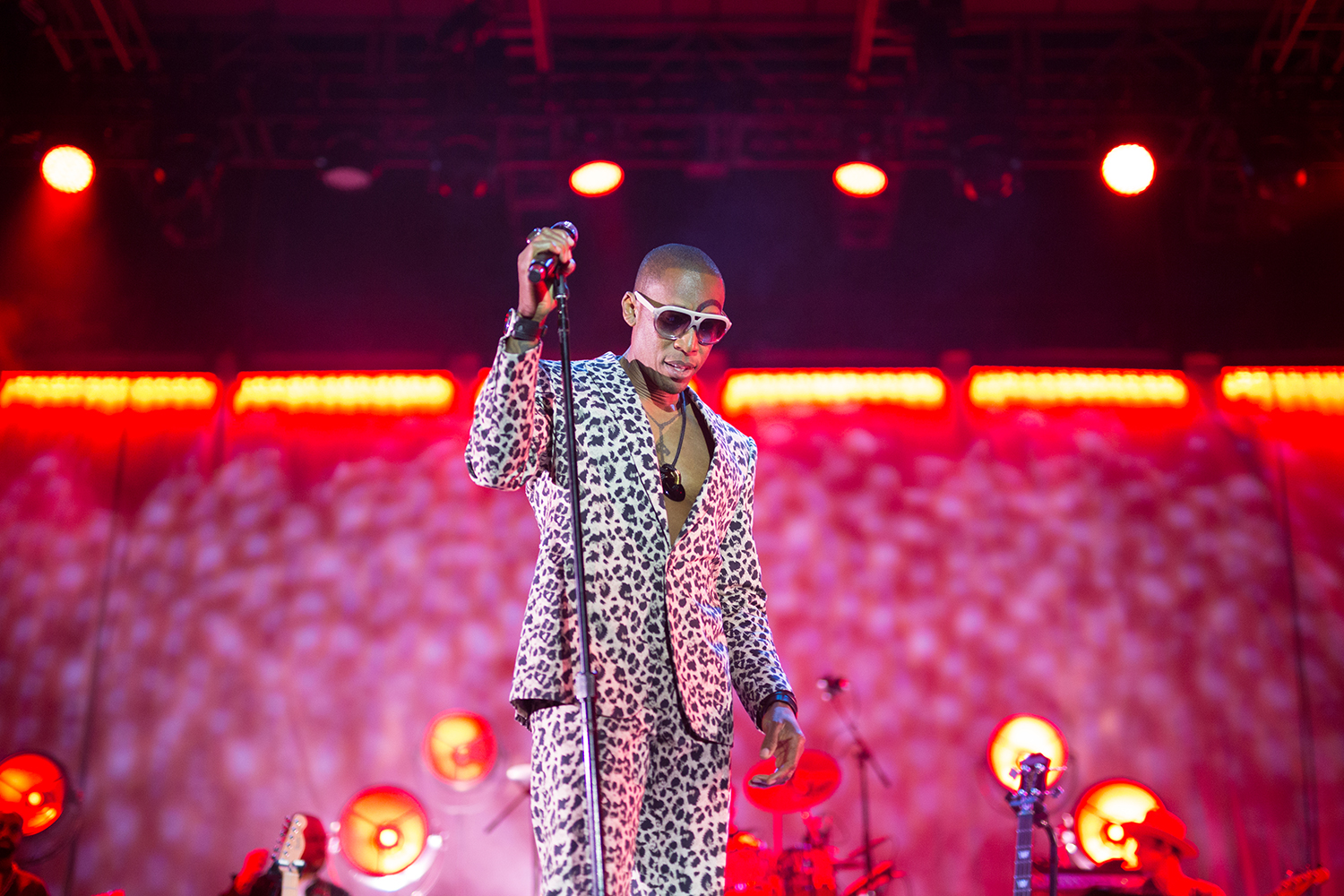Listening to Raphael Saadiq can feel like a time-traveling experience.
The celebrated musician can make music from the 1960s sound contemporary, as well as find the vintage sound in modern music with a voice that sounds like a time capsule of music spanning a multitude of decades.
That’s not surprising, since he’s been a professional musician for more than half of his life. As a teenager, Saadiq, now 51, was a bass player for Sheila E. when she opened for Prince on his Parade tour in 1986. He sang on billboard-topping R&B records and Gold-certified albums as a founding member of R&B groups Tony!, Toni!, Toné! and Lucy Pearl, all before he turned 36.
The compulsively prolific musician has spent the last 15 years releasing critically acclaimed solo albums, helping Netflix receive its first Oscar and Golden Globe nominations for best original song, and defining the musical identity of HBO’s hit series Insecure. Saadiq spoke with Digital Trends about the status of his first album since 2011, how it’s the musician — not the gear — that’s important in the studio, and how he would have made a different score for Black Panther.
You’re working on your first album release in seven years, but your song Rikers Island appears in the Pyer Moss show for New York Fashion Week. What can you tell me about that song and how it relates to the overall sound of the album?
Well, the sound of my record is a few different sounds. That’s more something I was feeling at the time. I actually did it a few days before. [Pyer Moss founder] Kerby [Jean-Raymond] heard it — he’s a really good friend of mine — and said, “this has to be in the show,” because I had put so many of these other songs for the show. This song just fit with a couple of Kendrick [Lamar] songs, Kamasi Washington, and Bruce Springsteen’s Born in the USA, but a darker version. It’s cool because I got a chance to see people sort of respond to it.
Actually, I haven’t even written the song yet. That’s the only part of the song that you heard. … I say [in the song], “too many niggas in Rikers Island.” I don’t live in New York. I live closer to San Quentin than I do Rikers. So I’m just using it as a play on words, like there’s too many people paying attention to the wrong things. I’m using it as a metaphor.
One of the things I love about you the most is you’ve internalized so much music. You’ve been a professional musician for 30 years. If you could go back, what are some of the most inventive music-making techniques you saw coming up that you use today?
“I don’t use anything that somebody can actually play with any new technology that’s out.”
I think some of the things I grew up watching were the simple things. Really, there’s a lot of people who have a lot of recording gear. I think the most impressive thing is to know it’s not the gear, it’s the person with the talent. Everybody has the same gear. Everybody can buy all this ’60s gear, compressors, and all of this stuff. None of it works if you don’t have the talent. I think the person that goes into the studio with an idea is a visionary for that time to send a message to people. That’s probably the most secret lesson I learned. You can have the equipment, but it’s really the person, the mind, and the vision that makes all of that work.
Are there any special techniques you’ve learned from people that you use now on your own?
Honestly, just being good. I work with a lot of engineers, and they have some microphone techniques. A [Shure] SM7 is a mic for if you have a really high-end voice and you want it to be warm. It’s a cheap mic. … It’s the same microphone Michael Jackson used on Off The Wall. … but it’s really inexpensive — some microphones cost $15,000, $20,000. When you think about that, then you think about Michael Jackson sang on a mic that maybe cost less than $200. That’s why I said, it’s really not the equipment. It’s the person who walks in and has the vision.
With the advent of streaming making it easier to access and release music, are you worried about your album getting lost in the sauce? It’s different from seven years ago, now albums are coming out every two weeks on streaming services. Do you ever get worried about that?
No, but I can see why you could be nervous about that. My thing is, if you go out and play the record, that’s something people want to see. You just have to go to the people. You can’t depend on streaming. Music was made to be played. It wasn’t really made for people to just get it and never see you play.
You are nominated for an Oscar and were nominated for a Golden Globe for the song Mighty River from Netflix’s original film Mudbound. How did you come up with the string and gospel production? What did you use to produce it?
“No one was working and thinking about an Oscar nomination or a Golden Globes nomination.”
Really just an acoustic guitar in the beginning, sort of writing the chord structure. Then grabbing Taura Stinson as a topline writer. Sitting with [Mudbound star and Mighty River singer] Mary [J. Blige], us all getting together in the same room and saying what it needs to be. Mary was actually there filming. Even though we didn’t get a chance to see the film, me, as a producer, I can look in Mary’s eye and figure out when she says, “Nah, that’s not going to work.” She was our only guide. If you know anything about Mary, you know she’s very passionate about what she does, and you can kind of trust when she says let’s go this direction, let’s go that direction. Taura is also very good at what she does. It was a sort of a winning team. At the time, we were just making the song. No one was working and thinking about an Oscar nomination or a Golden Globes nomination. I’m very excited about it.
Are there any audio programs or machines you use now that you wish you had back in the early 2000 Lucy Pearl days, or late ’80s/early ’90s during your Tony, Toni, Toné days?
Not really. I loved the way I had to do it. There’s easier ways to do it now. But, learning the way we did it, it was the best. It’s like playing basketball in your backyard, shooting through a box. I wouldn’t want anything that I have now back then. The things I had back then, I still have now that I use. Real drums, real percussions, real horns.
You said production on HBO’s Insecure starts back up in a few weeks. Have there been any preliminary conversations about what mood or sound you’re going to go for this season?
Not yet. I haven’t seen any of the new shows. I haven’t even seen the scripts. Once I read the scripts, and I see the new shows, I’m sure Issa is going to have some ideas. I’m excited about this season. It’s going to be fun, because everybody went away and did different things. It’s cool to watch Issa, the writers, and everybody come together and go for it again.
Will Insecure be the only TV show you work on or will there be others?
I’m sure there’s going to be a lot more.
As a music fan, I have to ask: If you could make a sequel to any album, what would it be and what would you add to it?
Wow. It would probably be Earth Wind & Fire. It would be Gratitude. The sound would be similar but a little dirtier. Well, that record was pretty dirty. I don’t know. A sequel would just be me being in a room with those guys. Whatever we came up with, I know would be great, because I’d hire the personnel that they did. All the producers. All the original horn players. Like-minded minds like them, so like today’s generation of horn players, piano players, drummers. Earth, Wind & Fire was jazz, soul, and also African vibes. They were everything everybody is still trying to be.
You can definitely hear their influence in today’s music, especially the sound of Childish Gambino’s Awaken My Love album.
Earth, Wind and Fire is the only group that could have been in today’s movie Black Panther.
Speaking of Black Panther, you would have been a great person to do a score for the film. Not to take away from Ludwig Göransson’s score, but what would you have done differently?
I guess I would’ve given more of a presence in the score to sound a little more ethnic and not just sound like a superhero movie completely. But the story was so great that it really didn’t matter. It was probably hard to make a movie like that. With the script, acting, and the actors, wardrobe, and then once you get to the music, you just want it to be done. That’s how most productions are. I would’ve probably made it a little more high energy. There would’ve been a couple of surprises. I don’t know what those surprises would have been. But with something like that, when you sit in front of a film like that, it’s so beautiful how they shot it. You see so many images of so many beautiful people. I couldn’t say [how I’d make it different], unless I was in a room with an orchestra and I was writing these parts. It would’ve definitely had come out different.
But, I didn’t watch it from that angle. The kid from Oakland that directed it [Ryan Coogler] went to school with my brother. I was just so happy for him. Everyday I just wake up smiling and laughing. It’s so beautiful that he talked about my city, Oakland, in the beginning [of the film], he talked about gentrification in the end, buying the building and helping the kids. I was so stoked from all of that stuff, I couldn’t even think about scoring when I watched it.
Are you definitely putting the album out this year? Is it still called God Willing, like you said in an interview last year?
Nah, I don’t know what the title is going to be, but it’s definitely coming out this year.





